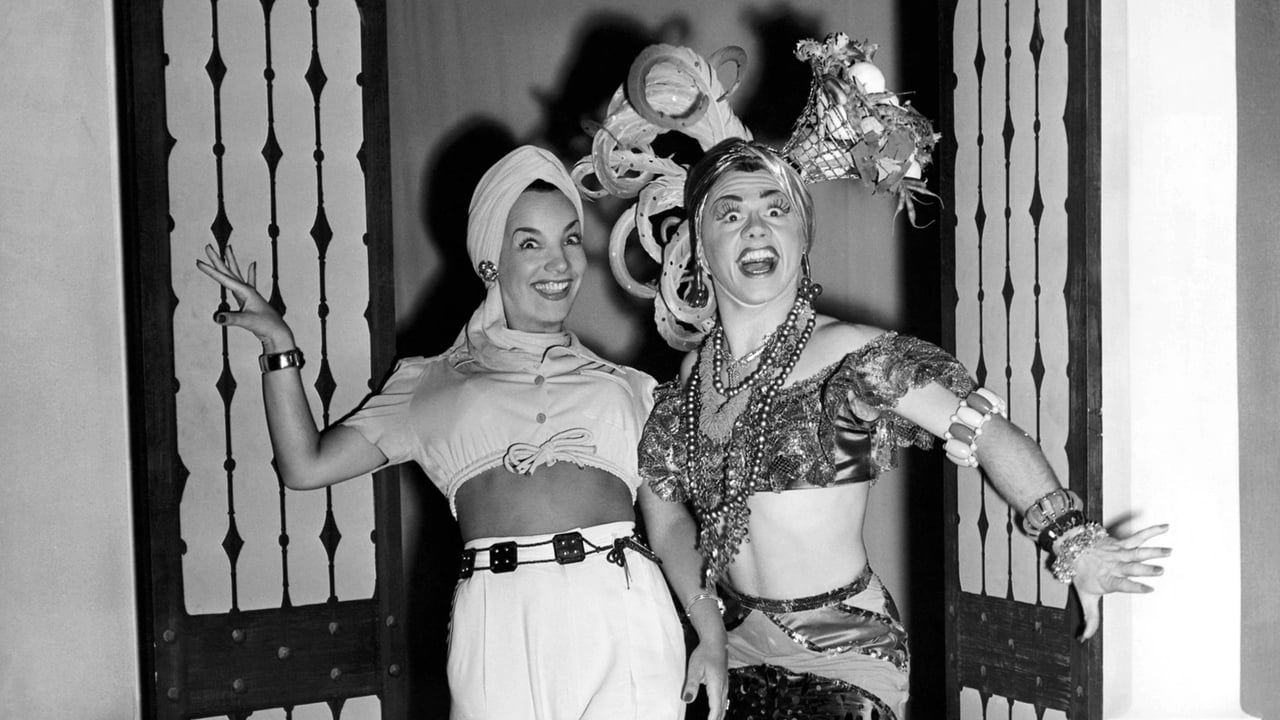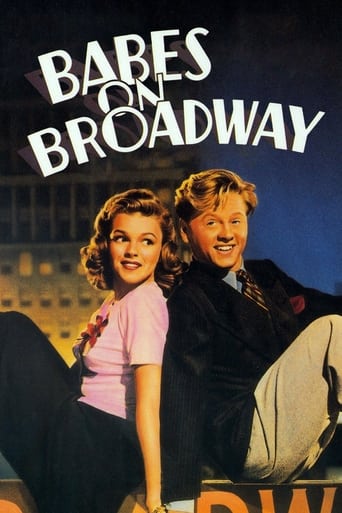

Very very predictable, including the post credit scene !!!
... View MoreToo many fans seem to be blown away
... View MoreI think this is a new genre that they're all sort of working their way through it and haven't got all the kinks worked out yet but it's a genre that works for me.
... View MoreTrue to its essence, the characters remain on the same line and manage to entertain the viewer, each highlighting their own distinctive qualities or touches.
... View MoreWhile Mickey Rooney did tend to overact throughout his career and not all his jokes worked, one cannot deny he was multi-talented and that his chemistry with Judy Garland (have always been a big fan of her) was unmatched. This is true in 'Babes on Broadway'.'Babes on Broadway' is my least favourite of their musicals ('Babes in Arms' had its problems but was a little better as an overall film regardless of its bowdlerised treatment of the musical), but Garland and Rooney and their chemistry are what saves the film. It works well as a musical, but fares problematically as an overall film, one can totally see the appeal but there are definitely understandable reasons as to why it won't click with others.The story is very contrived and the sentimentality and corniness went well overboard in places. Was willing to forgive that it was structurally thin, the contrivances and problematic tone less so. There is some wartime patriotism which feels both out of place (tonally it feels odd with the rest of the film) and heavy-handed, and some of the editing is on the bloated side, some of it not serving much relevance to the story.Unsurprisingly, the biggest criticism that 'Babes on Broadway' has gotten is regarding the "black-face" finale. Some of the criticism here has been over-the-top and I have seen plenty of classic period musicals to know that black-face routines were common at the time (it's very like being familiar with racial stereotypes in cartoons), still doesn't stop me not particularly caring for them. Wasn't offended as such here, but the finale did come over as overblown, rather tasteless and it has aged badly (even when judging it by 1941 standards and not by 2017 standards).However, even when not in Technicolor, 'Babes on Broadway' still looks lovely in crisp black and white and with elegant production design. As said, on the musical front (production values, songs, vocal performance, arrangements, choreography and dancing) 'Babes on Broadway' fares significantly better. The songs are very pleasant and lively, "How Are You", "By the Light of the Silvery Moon" and "Hoe Down" faring best, "Chin Up, Cheerio" is enthusiastically performed but a bit patronising. The choreography mostly has energy and tenderness, really appreciated "Hoe Down's" intricacy.Of the humour, Rooney's hilarious and pretty amazing impression of Carmen Miranda is a big standout. Garland does well too with her imitation of Sarah Bernhardt. Some nice fun wit and charm in the script, and Berkeley directs more than competently. 'Babes on Broadway' more often than not has a lot of energy and charm.Fay Bainter, James Gleason and Donald Meek are very good in their roles (then again they could phone in a performance and still be good), and Margaret O'Brien is adorable in a short pre-fame appearance. Ray McDonald's dancing is pretty incredible. At the end of the day though it is Rooney and Garland that make 'Babes on Broadway' worth watching. Rooney clearly has fun, even if he does overdo it at times, while Garland, on radiant and touching form, is even better. Their chemistry is wonderful.Overall, uneven film but Rooney and Garland delight hugely. 6/10 Bethany Cox
... View MoreI have one nitpick, the blackface routines near the end of the film. And the characters in this film chose to do a minstrel number just because they wanted to. At least in "Everybody sing", Judy did a blackface routine in that film because she didn't want her eccentric parents to recognize her because they were trying to ship her off to Europe. It was that era's biggest downfall. That downfall isn't such a problem today, but there are plenty of new ones now that weren't around then. Actually, people were nicer and more decent in almost every way back then compared to today with the big exception being racism. And I'm sure that many good hearted people of that time only acted racist because they were taught to and were pressured to by the smaller percentage of people that enforced racism to be part of that era's society. Anyway, the blackface numbers in this film is why I subtracted two points. All of the other parts of the film, I rate a 10. They were just as terrific as the other Garland/ Rooney musicals. I love Judy Garland. I love the singing, the sentiment and the passion in "Babes on Broadway". In some other reviews I've read on this film, they don't. I can understand them not liking incessant singing and dancing if it isn't that good. But with Judy Garland, it's wonderful. I like sentiment and passion in the innocent style of 1930s and 1940s musicals, and it was also more around back then in real life. And I love the way Judy displays it in her films. Judy, who was 19 in this film, sang "How about you" beautifully while dancing with Mickey in her apartment. I find it sort of similar to "Our love affair" in "Strike up the band" with her and Mickey and "Me and my gal" in film of the same name with her and Gene Kelly. "Chin up, cheerio, carry on" was also great. She sings her songs like an angel. And " chin up, cheerio, carry on" has an added wonderful touch to it with Judy taking care of the English children there escaping the blitz in WW2 England from Germany. It really tugs at the heatstrings and touched nerves on those who lived through WW2. I also liked the few theatrical numbers in this film that Mickey and Judy acted out to legends such as Sarah Bernhardt (who's been mentioned a lot in films during this era including in Judy's "Presenting Lily Mars"). The theatrical numbers here beared some similarity to the ones in "Strike up the band", except there it really happened in the story, here it was in Micky and Judy's imagination. The motive for Mickey, Judy, and the others putting on their block party so they could take the English children to the country was a nice touch. Many people today I'm sure will wonder what the big deal is about going to the country. I believe it was that smaller more simple pleasures in life pleased people more back then. Today, everyone feels entitled to so much more in order to feel satisfied, and takes things a lot more for granted. Back then, it was a real treat for poorer people who never before left the urbanization of the city to spend time riding through open fields, hills, and pastures. And to walk through babbling brooks and feel the wide openness and smell the fresh air of the rural beauty.
... View MoreThis was the first Arthur Freed (1939--MGM) production featuring Mickey Rooney and Judy Garland. Even by the standards of 1930s--this--as well as the other three--were fairly miserable productions. Rooney must be the most annoying actor Hollywood ever produced. And this does not take away what talent he had for dancing, miming, singing. By contrast, Judy Garland produces excellence whenever she appears. The songs are more than memorable--they are worthy of the Great American Songbook. But like the other three, the film grows tiresome after one viewing--I'm good for another twenty years before I see it again. But one would never say "My Fair Lady", "Three Penny Opera", "Gigi", Rodgers & Hammerstein, or Kern & Hammerstein, or Astaire & Rogers ever are tiresome. Those films always seem enjoyable with every presentation.Part of the problem and the film's leitmotif is high school students acting like grownups. Think a high school production of Hamlet. No matter how good it is, the production is still a high school production of Hamlet. And while both Mickey Rooney and Judy Garland were in fact teenagers in this film--that only added to the annoyance level. (Mickey was 17 or 18 when the film was made; Judy was about 15 or 16--so they were high school age kids.) And the viewer sorta had to wonder just how tall everyone was. Mickey at 5'2" and Judy a little taller; Guy Kibbee, etc...) During the Minstrel Show Mickey and Judy seemed to shine with excellence as dancers, such infectious enthusiasm. The Minstrel Show would have been part of the memory of most actors of that era. They had seen Minstrel shows as part of American Theatre. The Blackface of the Minstrel was not intended as an insult to Black Americans. (The Jim Crow laws were intended to insult Black Americans.) In the end, for me, the series of four films was more annoying than anything else. While the songs were great, while the production values were excellence--the combination of Freed and Busby Berkeley saw to that--while the talent was superb and rendition of songs was superb--the end product couldn't transcend the limitations of poor storyline, and Mickey Rooney's annoying personality. (And yet I can't think of anyone who should have played against Judy Garland in these vehicles.)
... View MoreI only caught the last 'number' in this film, the black-face routine featuring Rooney and Garland. As a 22 year old white college student in the south, I was shocked and offended by this. And that's coming from someone who isn't really offended by much at all and generally laughs at those in our society who are overly politically correct. Of course I've read about the black-face routines put on by Hollywood and certain performers back then, but seeing it on screen like that was just shocking. It's unbelievable to me that such a thing was accepted and glorified. Really almost makes me sick to watch it. Not only did blacks have to experience serious racism in their everyday lives in this country back then, they were mocked on screen for all to see. This film looks more like a homemade video confiscated from a Ku Klux Klan member's basement than a Hollywood production. I'm quite embarrassed and ashamed as an American.Even more shocking to me is that the career of Mickey Rooney continues to this day. I would have hoped once our society became enlightened enough to understand just how unacceptable and ridiculously offensive 'shows' like this were, that actors like Rooney and others who appeared in such films would have a harder time finding work. Rooney has appeared in 3 movies this year (2005), so I suppose not.
... View More